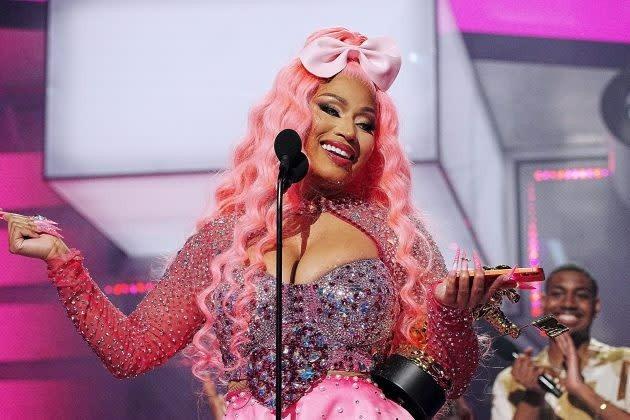Nicki Minaj, the iconic rapper who rose from humble beginnings to global superstardom, has solidified her place as one of the most influential figures in the music industry. With her groundbreaking artistry, unmatched versatility, and unapologetic presence, Minaj has not only dominated the hip-hop world but has also redefined what it means to be a female rapper in a genre long dominated by men.
Here's ads banner inside a post
As the self-proclaimed “Queen of Rap,” Minaj has left an indelible mark on the industry, inspiring countless artists and shaping the trajectory of female hip-hop. But how did she rise to this position, and what keeps her on top in an ever-evolving music landscape?
The Rise of a Queen
Born Onika Tanya Maraj in Trinidad and raised in Queens, New York, Nicki Minaj’s journey to stardom was anything but easy. She worked tirelessly in her early years, releasing a series of mixtapes that showcased her lyrical prowess, unique style, and ability to adapt to various musical influences.
Her big break came in 2010 with the release of her debut studio album, Pink Friday, which catapulted her into the mainstream. The album’s standout tracks, including Super Bass and Moment 4 Life, not only topped charts but also became cultural phenomena. Minaj’s colorful persona, sharp lyricism, and distinctive voice made her a household name, distinguishing her from other artists of the time.
Here's ads banner inside a post

In the years that followed, Minaj continued to push boundaries with her music, blending hip-hop with pop, dancehall, and R&B to create a genre-defying sound. Her subsequent albums, including Pink Friday: Roman Reloaded and The Pinkprint, further cemented her legacy as a multifaceted artist capable of delivering chart-topping hits and deeply personal anthems.
Shattering Glass Ceilings in Female Rap
Nicki Minaj’s influence extends far beyond her music. She is widely credited with reviving and revolutionizing female rap at a time when the genre was largely overshadowed by its male counterparts. Before Minaj, the landscape for women in hip-hop was sparse, with only a few prominent figures like Missy Elliott, Lil’ Kim, and Queen Latifah making waves in the 1990s and early 2000s.
Here's ads banner inside a post
Minaj brought female rap back to the forefront with her commercial success, breaking records and proving that women could dominate in a genre often perceived as male-dominated. She became the first woman in hip-hop to achieve countless milestones, including being the first female rapper to sell over 100 million records worldwide.
Her achievements inspired a new generation of female rappers, including Cardi B, Megan Thee Stallion, Doja Cat, and Latto, who have often cited Minaj as a major influence on their careers. By unapologetically owning her success, Nicki Minaj paved the way for these artists to thrive in an industry that had historically marginalized women.
A Legacy of Versatility and Innovation
What sets Nicki Minaj apart from her peers is her unparalleled versatility. Few artists can seamlessly transition from delivering hard-hitting rap verses to singing soulful melodies or creating pop anthems. Her ability to adapt to different genres has allowed her to remain relevant and appeal to a wide audience.
Tracks like Anaconda showcased her playful, provocative side, while songs like Chun-Li reaffirmed her dominance in hardcore rap. Meanwhile, features on tracks such as Bang Bang and Tusa highlighted her ability to collaborate with artists from diverse musical backgrounds.
Her innovation isn’t limited to music. Minaj has also made a name for herself in fashion, acting, and business. Known for her bold and eccentric style, she has become a trendsetter, often using her wardrobe as an extension of her artistic expression. Additionally, her ventures into cosmetics, fragrances, and other business endeavors have further cemented her status as a global icon.

Navigating Challenges and Controversies
Despite her immense success, Nicki Minaj’s career has not been without challenges. She has faced criticism, rivalries, and controversies, often amplified by social media and the pressures of being a public figure.
Her much-publicized feuds with other artists, including Cardi B and Lil’ Kim, have dominated headlines, sparking debates about competition and unity among female rappers. While these rivalries have occasionally overshadowed her accomplishments, Minaj has consistently risen above the noise, reminding fans and critics alike of her undeniable talent and work ethic.
Minaj has also been candid about her struggles with mental health and the pressures of fame. Her openness has resonated with fans, humanizing her and offering a glimpse into the realities of being a global superstar.
The Current Reign and Future Legacy
As of 2025, Nicki Minaj remains a dominant force in the music industry. Her latest album, Pink Friday 2, has been met with widespread acclaim, with critics praising her lyricism, storytelling, and ability to stay ahead of trends. The album’s success reaffirms her status as one of the greatest rappers of all time, regardless of gender.
Minaj has also embraced her role as a mentor and supporter of rising female artists, frequently collaborating with and championing newcomers in the industry. Her influence continues to shape the sound and culture of hip-hop, ensuring that her legacy will endure for generations to come.
Nicki Minaj: The Unshakable Throne
Nicki Minaj’s impact on hip-hop and the broader music industry cannot be overstated. She has shattered glass ceilings, redefined what it means to be a female rapper, and inspired countless artists to follow in her footsteps.
With her unparalleled talent, resilience, and ability to adapt, Minaj has proven time and again why she is regarded as the “Queen of Rap.” As she continues to evolve and push boundaries, her throne remains unshaken, a testament to her enduring influence and unmatched legacy in the world of music.




